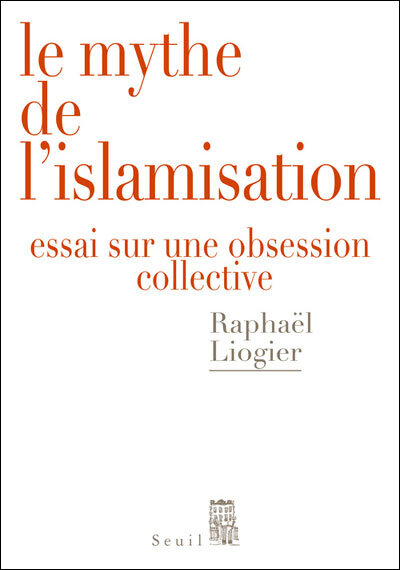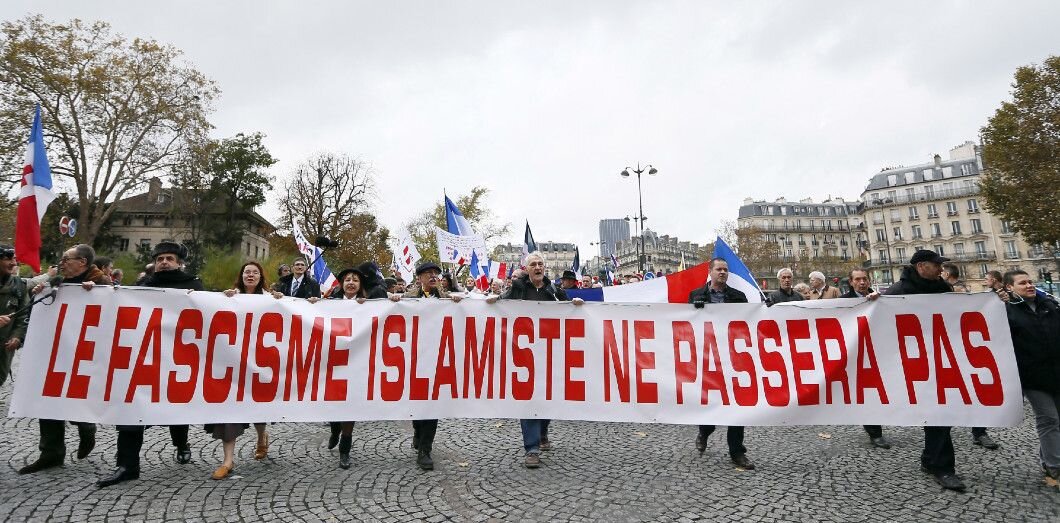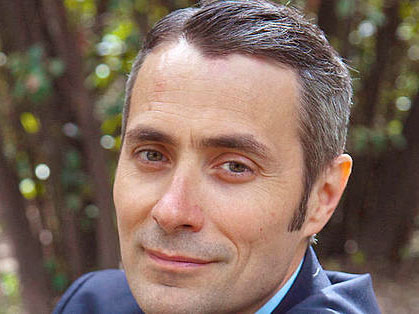Iraqi artist Dia al-Azzawi’s “Elegy to My Trapped City,” acrylic on canvas, 240 x 800 cm, 2011 (photo Matthew Lazarus).![]() <
<
How I Became a Known Islamo-Leftist
Raphaël Liogier
The reader of this article may not be aware that the author is regularly referred to as an Islamo-leftist or islamo-gauchiste in France. Far from being a bias, this is an advantage in understanding the meanings of this increasingly common expression in its French context. The very surprising way in which I suddenly became an Islamo-leftist is enlightening. First, I am not a specialist of Islam, and I never claimed to be one. As proof, my doctoral thesis was on the westernization of Buddhism. In it, I analyzed how an idealized vision of this extreme Eastern religion has gradually been constructed, along with globalization, in Europe and North America in particular. After my thesis defense, the sociologist Jean Baubérot, who was a member of the jury, made an unexpected suggestion to me. I still remember his mischievous smile when he said: “You have shown how Buddhism became the good religion for Westerners, perhaps you could try to understand with the same method how Islam could have become the bad one.”
The idea appealed to me and so I began to look at the Western vision of Islam, more precisely at the vision of the Europeans and first of all the French. I have, it is true, published articles comparing the orientalist, idealized vision of Buddhism and the orientalist, idealized vision of Islam. From the end of the 18th century until the 19th century, Islam had a philosophical and spiritual aura, comparable to that of Buddhism today. The mystic René Guénon, who was so influential in the esoteric circles of the early 20th century, and who is still influential today among many Freemasons, was, for example, more fascinated by Islam than by Buddhism. One article I published showed how Islam had lost this aura, through the ordeal of colonization and decolonization, and then the rejection of immigration.
To sum up my hypothesis: Islam has become too present, first of all humanly, to remain exotic; too associated with economic problems and social anxieties. It was not an idyllic vision, therefore, on my part, but only a matter of research on the evolution of representations, carried out with the same methods as in my thesis on Buddhism. This study is certainly open to criticism, but it has no ideological aim.
I decided to go further, driven by curiosity, by the famous libido sciendi, the desire to know. Since the middle of the first decade of the 21st century, Islam was no longer merely denigrated, despised and assimilated to the religion of the colonized. It has become the object of an anguish of being colonized by those whom “we” had once colonized, the Arabs and the Africans in particular. These non-Europeans of origin, particularly the North Africans (Maghrebis) now settled in our latitudes, all became potentially Muslims. The word Muslim became a kind of officially non-racialized code name for the intolerable other, the foreigner from within, secretly over-powerful and at war with “us.” The expression “occupation” to refer to “street prayers” linked to the cramped conditions of some mosques (I checked!) could not leave any doubt.
Le mythe de l’islamisation (2012) by Raphaël Liogier.
 <
<
The overthrow is evocative: Muslims were now perceived as the strongest. Symbolically first (they would have cultural power) and numerically (thanks to massive immigration, an above-average birth rate and a dizzying number of conversions). I naively wanted to verify these “catastrophic” assertions by consulting the available statistics. Quite frankly, I was surprised by the results, which roughly showed that immigration from Muslim countries was stable (this is less the case today after the Syrian events and the Arab uprisings); that the birth rate of putative Muslims was lower than average; and finally that the conversion rate was very low (e.g. much lower than conversions to evangelical Christianity).
When in 2012 I published The Myth of Islamization, which was for me a non-polemical sociology book, clearly providing its sources and offering different hypotheses, I was propelled onto the media scene. I immediately had to defend myself — even before talking about the real content of the book — against those who accused me of being scandalously unrealistic; of having malicious intentions; of being a “useful idiot” in the service of radical Islamism; even of being a dhimmi (subject to the dictatorship of Islam). I was even accused of being a collaborator, since Islam was becoming the warrior banner of an over-powerful enemy occupying the national territory. Anti-Muslim sites such as Riposte Laïc were unleashed against me, as well as media stars such as Caroline Fourest in the middle of a crusade against Tariq Ramadan (the same Tariq Ramadan whose speech I also criticized, although without demonizing him).
That’s how I became an “Islamo-leftist”: no longer a normal researcher, no longer even just a witness, but the recalcitrant actor of a social staging that surpasses me.
Islamism and leftism
I tried to understand this strange situation, which was as interesting sociologically as it was uncomfortable personally. Let’s start at the beginning. The historical link between certain left-wing ideologies and Islamism is undeniable. Not with Islam as such, but with the Islamist ideology that was built up from the 19th century, partly through criticism of the modern West, then of consumerism, then of colonialism, and, more broadly, of racial and social inequality. Let’s not forget that the intellectual sources of the Muslim Brotherhood, and of Islamism in general — like Sayyid Qutb who resided in the 1940s in the United States, whose culture he hated, according to him, was one of bestial jazz, sexual promiscuity and social inequality — were fervent readers of the great Marxist thinkers and theorists of the Frankfurt school; questioning consumer society and the degeneration of liberal democracies, adding to it the Islamic dose of disgust for evil sexual behaviors. Let us even remember the importance of the Muslim factor in the struggle for civil rights in the United States in the 1960s, with emblematic figures such as Malcolm X, who became a martyr for the cause of African Americans. Islamism ostensibly presented itself as the champion of the struggle against destructive capitalism, the bearer of the claims of the damned people of the earth. A sort of Third World religiosity, an alternative to the dominant Western Christianity which gave birth to capitalism (according to Max Weber’s famous thesis). In fact, this ideological orientation was not originally exclusively left-wing. A whole section of Islamism became imbued with anti-modern Heideggerian decadantism, including Qutb himself, who was also an extreme nationalist. It is even said that Imam Ayatollah Khomeini was a regular reader of Martin Heidegger.
The mystique of authenticity, of traditional rootedness, symmetrical to the disgust of inauthenticity and modern uprooting, made a great impression on some fathers of Islamism. But, finally, it was rather the Marxist or at least anti-consumerist tendency that took over. This is undoubtedly what aroused the admiration of Michel Foucault in 1978, who was then present in Iran on behalf of European newspapers. The philosopher of freedom said he was “impressed” by the emancipatory power of Shiism, this “political spirituality.” Acknowledging that he did not know Islam, and even less Iran, well, he was blind to the potential violent outbursts and reactionary sources of Khomeiniism. Yet he was a contemptuous observer of all forms of political control and the insinuation of power in the heart of intimacy.
In any case, there is one point on which Foucault was not mistaken: there was indeed a “political spirituality” there, which could be called Islamo-Marxism, which, in its radical version, went so far as to justify terrorist acts from the 1980s to the attacks on the Twin Towers of New York — the flagship city of western financial and consumer corruption. Political scientist and Islam researcher Olivier Roy points out, against those who would like to see it as an expression of a clash of religions and civilizations, that most Islamist terrorist attacks up to September 11, 2001 were aimed at symbolic targets of consumer society and capitalism, and not at religious symbols. Islamist terrorism will thus try, using the same modalities of action, to take over from violent extreme left movements such as the Red Brigades in Italy, Direct Action in France or the Baader-Meinhof gang in Germany. All these revolutionary groups were dismantled in the 1980s, with the exception of the Red Army Faction which died out in 1998.
Western societies facing an identity crisis
So, yes, there are objective reasons for interlinking certain left-wing themes and certain Islamist movements. The incongruity does not come from making the link, but from the growing success of the expression “Islamo-leftism” in our time (and specifically in France) — roughly since the middle of the first decade of the 2000s (and now even more than before, with two members of the French government officially using this pseudo concept as if “Islamo-leftism” were an undeniable reality that is threatening “our” culture).
It is strange, in fact, that at a time when no intellectual, left-wing or otherwise, is fascinated by Islamism, this notion is becoming so successful. The notion is becoming generalized, but with a change of meaning. Instead of defining a body of ideas, it becomes exclusively polemical, serving to discredit the adversary in diverse political debates (sometimes not even related to religion or Islam in particular). But I realized when I myself entered the category, as I mentioned — it was used to discredit researchers and intellectual in debates about the meaning of secularism, and about the treatment of the Muslim populations living here in Europe. Someone like François Burgat, like Olivier Roy, like Jean Baubérot, like Pascal Boniface could be excluded from the debate under the pretext that they are fellows of Islamism. The first two are certainly Islamologists and political scientists, they are obviously interested in political Islam, they are rather on the left, and are worried about the identitarian discourses that are increasingly labelled as secular, republican, etc. But apart from these points, they agree on almost nothing!
The third researcher, Baubérot, is simply the world’s most recognized academic specialist on French secularism. All he has done to deserve the insult of being an Islamo-leftist is to have tried to return to the historical and legal definition of “laïcité” (French political secularism). Finally, the last one, a geopolitologist by profession, to my knowledge has only stressed that one can be critical of the policies of the State of Israel without being antisemitic. And all I did was to write, basically, that there was no concerted plan among Muslims to conquer Europe, to overwhelm this continent, and that the wearing of the veil was not in general an emblem of conquest.
It’s quite banal, in
short. And I repeat that my scientific interests do not focus on Islam, but on the changes in human identity in the 21st century. As proof, my publications — which seem disparate, and therefore disconcerting to those who want me to be an Islamo-leftist by profession — deal with new spiritualities, personal development, cults, the collective fear of artificial intelligence (at least as strong as the fear of Islam), the fear of being replaced by machines, the evolution of gender relations, and so on.
The most serious problem being shown all this fuss around “Islamo-leftism” is the crisis of universalism.
I believe that my focus on identities, as a sociologist as well as a philosopher, has been useful to understand what is really at stake. Indeed, the new and generalized use of the word Islamo-leftism is becoming clearer in the light of the extension of the European complex losing its global centrality, a complex that has now even reached the United States. Since 2003, we have seen the growing success of decadent, tragic speeches announcing the collapse of Europe. The decline of Christian values, Republican values, democratic values was announced — not only in France, but also in Austria, Italy, Spain, Holland, the United Kingdom. All over Europe. Small political parties bearing this discourse emerged, neither from the right nor the left, but defending the “peoples” that were attacked by the multiple forces of globalization, capitalism, by tides of malevolent immigrants, and specially by Islam as a force synthesizing all those evil forces. Islam was defined as global, anti-Christian, anti-democratic, against gender equality, and even, as the novelist Richard Millet writes, an ally of capitalism (even if this last assertion does not align with any concrete facts!).
These small parties have become more and more important. We have the former Front National in France (which suddenly began to defend secularism, since it became a principle of identity warfare and not freedom of worship), the Party of Democracy of the Center in Switzerland (which had the construction of minarets banned), the Freedom Party in Austria, the Party of Progress in Norway, Alternative for Germany, UKIP in the UK, and so on. Speeches from these party leaders have infiltrated the general public and the more traditional political parties, both from the right and from the left. This is what is called populism: neither right nor left, but which is based on the scheming and anguished staging of the collapse. In the name of the defense of our values (democratic, Christian, secular, all in the same bag), those new parties are eating away at them in concrete terms. They attack liberty to defend it, because we are presumably in a situation of emergency. From the protection of freedom of worship, secularism becomes the pretext of a war against “the others'” identity. Those who refuse these aberrations are classified as “Islamo-leftists”; in other words, they become ipso facto traitors, collaborators, weak, unrealistic. For the populist has the cult of the Real, which is what everyone is supposed to feel. He knows the truth of the war that is being played out and for which there is no room for a rational discussion.
A populist anti-Islamo-lefist and anti-“Islamic fascist” demonstration in Paris, Nov. 2020 (photo Kenzo Tribouillard / AFP) <
<
It is these types of National Socialist discourses (neither left nor right) that have already on several occasions come close to destroying liberal society, that of equal rights and freedom of expression. Yet the same refrain is played over and over again, always with the same verses. The traitors were the Dreyfusards at the end of the 19th century in European societies haunted by the feeling of collapse. In the 1930s, it was those who refused to see the Judeo-Bolshevik attack against Europe who were accused of being traitors. Today, the traitors are those who refuse to let our principles be twisted in the name of our existential, social and economic malaise at the beginning of a millennium that is slipping away from us. The suffocating scene is thus set, with voluntary or recalcitrant actors. On the one hand, the real people are deceived and scorned, with as allies the heroes (that could be journalists or politicians) who defend them, whether they call themselves left- or right-wing. On the other side, the “fake peoples,” false tokens, pretending to be citizens. It becomes natural to think about stripping them of their citizenship more legitimately than the legal system would a serial killer. The Muslim has become the ideal type of this “fake citizen”; and who is himself protected by the traitor who swarm everywhere on television, in the newspapers, in politics, who are collaborators and lawless bobos.
In short, you have recognized the Islamo-leftist.
This confiscation of the debate by assigning contradictors to the role of the enemy or of traitor is very serious. The underlying issue is the redefinition of universality. It is the survival of liberal open society, as conceptualized by Emmanuel Kant, Benjamin Constant or Alexis de Tocqueville that is at stake. That which goes back to the relativism of Montaigne and Montesquieu which implied the respect for the way of life and thought of the other within the limits of his own respect for our way of life and thought. Putting people in relation to one another (that’s why we say “relativism”) on the basis of a common background is the basis of liberal society. The populist redefinition of universalism as an exclusive value — the paradox is remarkable — is quite the opposite, for it implies the refusal to accept that the other lives among “us,” with the famous slogan “let them go home if they are not happy here.” A slogan applied, for example, to young people of North African origin assigned to their belonging to Islam, even if they are not Muslim and if they were born in France. This is what specialists calls differentialism: “they are fine in their difference as long as they stay in their own country.” For a differentialist, like Samuel Huntington, the “others,” Muslims for example, are culturally unfit for universality, which would be nothing more than a cultural production of Westerners for Westerners, with the corollary of the inaptitude of the “others” for democracy, and even for freedom.
The debate is clear. For my part, I stubbornly remain on the side of human rights, of real freedom, as conceived by Montaigne and Kant, and therefore, of course, on the side of Aristide Briand‘s political secularism, that of the 1905 law (for the French separation of church and state), whether this makes me an Islamo-leftist or not.



